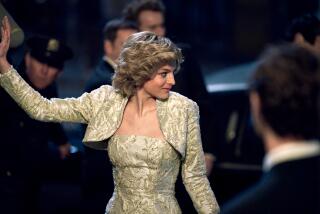THE ROYALS.<i> By Kitty Kelley</i> .<i> Warner Books: 548 pp., $27</i>
- Share via
The late Evelyn Waugh would always say, when the name of the present Queen Mother was mentioned, that she could not become pregnant unless suspended by both ankles from a large chandelier. Since this was the same Evelyn Waugh who declined to exercise his right to vote (on the grounds that it would be impertinent to advise the crown on its choice of ministers), his observation counted as brittle witticism, gossip as fresh as uncorked champagne, delicious upper-class malice.
But let Kitty Kelley tell her version, about a Queen mother subjected to the rigors of artificial insemination in order to produce the current Queen and her frightful sister Princess Margaret, and there is widespread shock and derision. How vulgar, if true! Why, the next thing you know, authors and publishers will be writing and issuing books for ready money, just like tradesmen. Thus the unfunny snobbish side of Waugh survives as a mainstay of American book chat, and Michiko Kakutani of the New York Times can blame the royals for their own misfortunes and Kelley for writing them down all in the course of the same cute little review.
I should announce my interest and say that I am acknowledged by Kelley as having suggested people for her to interview and am quoted (in a slightly garbled fashion) in one of her anecdotes. I feel myself neither compromised by the first fact nor unduly irritated by the second. It gives me a point of vantage from which to judge the job she has done. Thus, just to take the most sensational of her suggestions--the artificial insemination story--she doesn’t mention Waugh, but she does give the name of a physician and she does include a joke I hadn’t heard before. (The Duchess of Windsor, Mrs. Simpson to you, once revealed that her husband, the king’s brother, had had the same difficulty and in general “wasn’t heir-conditioned.”)
On the matter of Prince Philip’s boorish private life with a string of dull upper-crust mistresses, also revealed by Kelley, all I can say is that it accords with every story told by every observer and courtier since 1947. The fact that no book published in England has ever dared to relate the tale is a condemnation not of American investigative reporters but of the slavish Fleet Street press and the oppressive English libel laws. As for the other headline assertions, about the need for chemical enhancement demonstrated by Sarah Ferguson or the fabulous parsimony manifested by the queen, to say nothing of the anti-Semitism of Princess Margaret, it was high time that somebody put all these tales between two covers. We have long needed a handy compendium or digest of royal gunk.
In case you are wondering, or perhaps even trembling, nothing distressing or disagreeable is said about our newest saint and newest Madonna, the Blessed Diana Spencer. Or perhaps I should better say, nothing distressing or disagreeable that we didn’t already know. She comes across, usually in her own account, as a narcissistic borderline airhead with some personal charm and a huge need for vengeance on the lugubrious family that used her as a breeding machine and then chucked her aside. Make a “People’s Princess” out of that, if you will, or indeed a “Queen of Hearts.”
Some have said, usually with a touch of schadenfreude, that Kelley was unlucky in the timing and release of her book. I don’t think so. Here is the unvarnished story of a spoiled kid way out of her depth, exploited and exploiting, written well before the moldering ramparts of flowers made all objectivity impossible. My advice: Read it and, for goodness sake, try not to weep.
Kelley does not claim to be a professional historian and, truth to tell, doesn’t take the royals all that seriously. But I think she is on to something when she suggests that everything can be traced to the renaming or retitling of the ruling house. When the Saxe-Coburg-Gotha family, which became the Battenberg clan, changed its name to “Windsor” in 1917, it was to avoid the imputation of being German from which we get the simplistic translation of “Battenberg” to “Mountbatten.” This was for the apparently excellent reason that Britain and Germany, or rather the British and German royal houses, were at war at the time. It was thought good to distract attention from the latter aspect of the situation. H.G. Wells, in a celebrated article, had referred to the king as “alien and uninspiring.” His majesty is said to have boomed, “uninspired I may be, but alien I am not.” And so the change of name, to one more consonant with the roast beef of Old England, was made.
But ever since, a gloomy element of denial and self-hatred has hung over the Hanoverian court. Worse still, tentacles keep reaching up from beyond the grave. Several “Windsors” involved themselves on the wrong side during the battle against the Third Reich. The palace was honeycombed with appeasers and fifth columnists. Sheer luck and good public relations--the Windsors violated their own privacy by ordering the cameras into the private apartments on the very day the Luftwaffe hit Buckingham Palace--bought some time and goodwill. But the nagging and oppressive sense that the family had to sacrifice itself to keep up a false front, and that nothing in dynastic life could be normal or human, helped bring us the dysfunctional and mediocre lineup that we see today.
Walter Bagehot, founder of the Economist magazine and author of “The English Constitution” (an odd but perhaps not unique example of a title that describes a nonexistent subject), divided British institutions in a functionalist manner between those that were “dignified” and those that were “efficient.” The former, useful in suggesting continuity and tradition, depended on magic and illusion. The latter, like the Royal Navy or the Civil Service, depended on ruthless practicality.
But the performance of the latter was supposed to be, and sometimes actually was, paradoxically enhanced by the former. This sleight of hand worked quite well for a while, with only radical curmudgeons like William Cobbett noting that, although it was always the Royal Mint, it was always the National Debt. Probably all societies employ this division of labor in one form or another, keeping two sets of books and trying to distinguish between, say, the president and the presidency. But what happens when a kept and cosseted royal house ceases to be dignified without becoming efficient?
Well, this is what happens. The queen, sensing that a deluge may follow her departure, announces that she will never abdicate. At once, her first-born son, already moth-eaten, looks even more dowdy and resigned to the idea that he may be over 60 before he inherits the throne. Skip all this, cries the passionate mob. Let’s fast-forward through Mum and Sonny and go straight to the grandson--the pretty one with the beguiling smile. But that would not be following the script of the hereditary principle, which dictates a plodding and orderly succession.
The palace and the mob may superficially make natural allies. Elitism and populism are not as antithetical as some people believe. (Both, for example, are hostile to democracy.) But there is an insuperable paradox. If you want the voice of the people to determine the head of state, as the pro-Diana forces seem to argue, then you can’t restrict the office to one family, the principal foundation of primogeniture.
Kelley, in her fossickings around in the attics of royalty and lineage, has understood this very well. The queen mother may indeed have had to dangle grimly from that chandelier and may in fact have been born on the wrong side of the Earl of Strathmore’s blanket. But all these debauched old fossils did what they did for England, and for the line, and will not be deflected by opinion polls or popularity contests. This suggests, at any rate to me, that the future will not be pretty or, in any event, not as pretty as Prince William.
The last time a book on this subject caused a comparable sensation was when Andrew Morton published “Diana: Her True Story.” The prime minister denounced it. The archbishop of Canterbury anathematized it. Harrods wouldn’t sell it. The non-tabloid press announced that it was just the sort of sordid, privacy-invading garbage that they didn’t choose to touch. And--what do you know?--it was all true, every word of it. And how do we know that? Because Princess Diana was the principal source. And how do we know that? Because after lying charmingly for a while, she coquettishly owned up.
So be careful not to be so fastidious that you miss Kelley’s book. Don’t you want to know who treated and counseled “Fergie,” and for what? Don’t you want to know the subject that was discussed on the missing minutes of the Princess Diana-James Gilbey “Squidgy” tapes? Don’t you want to see the pictures of Edward and Mrs. Simpson greeting Hitler with a warm clasp? (The former king gave the salute and the heil too.)
I have never agreed with the narrator of “Anna Karenina,” who wrote that happy families are all alike and that all unhappy families are unhappy in a different way. It seems to me, having met more than one member of the House of Windsor and its cadet branches, that there is a pervading falsity and sadness recognizable in other families but also distinct and individual to the general nature of monarchy. For a society to demand that a single family lead an unnatural and artificial and cloistered existence, and then be ready to act with joy and spontaneity when required, is to make an impossible and unreasonable demand.
The cruel primitives in Sir James Frazer’s “Golden Bough” used to treat their “temporary kings” in the same arbitrary and capricious manner before sacrificing them. If a cat can look at a king, says Kelley, so can a kitty. If a monarchy can cause arrested development in its subjects, so may the subjects be the cause of arrested development in a royal family. And if a feline can work this out, then why cannot our celebrity-infested mass media, which bores us from dawn until dusk with the dreariest monarchical tidbits and then denounces the first critical biography in years as wanting in good taste?
More to Read
Sign up for our Book Club newsletter
Get the latest news, events and more from the Los Angeles Times Book Club, and help us get L.A. reading and talking.
You may occasionally receive promotional content from the Los Angeles Times.










